Colombia halts coal exports to Israel amid Gaza Genocide
Colombian President halts coal exports to Israel over Gaza war, citing ignored orders from August 2024.
Source link
Stay informed and up-to-date with the latest news from around the world. Our comprehensive news coverage brings you the most relevant and impactful stories in politics, business, technology, entertainment, and more.
Colombian President halts coal exports to Israel over Gaza war, citing ignored orders from August 2024.
Source link
Downing Street has no plans for a bank holiday to mark the Lionesses’ Euro 2025 win, the BBC understands.
England made history on Sunday as they retained their title against World Champions Spain after a dramatic penalty shootout in Basel.
A homecoming parade will be held in central London on Tuesday, with an open-top bus tour culminating in a ceremony outside Buckingham Palace.
But the government appears set to confirm there will be no bank holiday to mark the occasion, in line with what happened when England won the same tournament three years ago.
Calls for a bank holiday after a major football success are not new, but none were held when England’s men’s team won the World Cup in 1966, nor when the Lionesses won the Euros in 2022.
Sir Keir has previously suggested he would be open to giving people a day off work to celebrate an England win, saying at the time that the 2022 victory should be “marked with a proper day of celebration”.
When the Lionesses reached the World Cup final against Spain in 2023, Sir Keir said “there should be a celebratory bank holiday if the Lionesses bring it home”.
Downing Street will likely have an eye on the economic cost of announcing an extra bank holiday.
Government modelling has previously put the cost at £1.36bn, while accountancy firm PwC estimated the figure would be closer to £831m.
Sir Keir watched on from the stands as England clinched a win on penalties, after the two sides held each other at 1-1 after 90 minutes and extra time.
Spot kicks from Alex Greenwood, Niamh Charles and Chloe Kelly, as well as two huge saves from goalkeeper Hannah Hampton, were enough to see England emerge from the tense match victorious.
The prime minister described the team as “history makers” after the full-time whistle, adding: “You dug deep when it mattered most and you’ve made the nation proud.”

A lunatic. An idiot. A person of unsound mind.
These three phrases were used in The Nigerian Lunacy Ordinance of 1916, later modified into The Lunacy Act of 1958, to describe people battling mental disorders. Beyond these descriptors, the act stated that individuals with mental illness could be confined in asylums based on the judgment of a magistrate, medical officer, or family member, regardless of their consent to such confinement.
The legislation was inherited law from the colonial masters, copying the cultural norms of the United Kingdom’s mental health affairs of the 1900s. However, with criticisms from institutions like Cambridge, which argued that the act “hampered the progress of the mental health movement for nearly 70 years”, the UK came up with the 1959 Mental Health Act, officially repealing the old law. They described their new act as “a fresh provision with respect to the treatment and care of mentally disordered persons”. Among other changes, stigmatising words such as “lunatic” and “asylum” were replaced with terms like “mental disorder” and “patient”, giving mentally afflicted people the choice to seek help for themselves.
Nigeria, however, had other ideas.
While the UK took this step in a new direction, Nigeria steadfastly held on to the 1958 Lunacy Act, and for decades, the country would show no signs of amending it.
The urge for change went on for years, with judicial officers like the Chief Judge of Lagos State, Justice Olufunmilayo Atilade, asking for a reform of the Lunacy Act at a Bench and Bar Forum in 2016. She criticised the state of the Lunacy Act, explaining that the laws remained grossly inadequate and hopeless in dealing with the situation in Nigeria.
The Lancet Global Health journal also regarded the act in 2020 as “reflective of a period in human history not only when mental health was severely misunderstood but also when the treatment of people with mental health care needs was both inhumane and ineffective.”
Even mental health advocacy groups lent their voice to the fight. In 2021, the Mentally Aware Nigeria Initiative (MANI) hosted an X space, speaking out against the act and urging the legislative arm to repeal and replace it with something more humanising. Some Nigerian psychiatrists also lent their voice to the matter, with the President of the Association of Psychiatrists in Nigeria, Taiwo Lateef, explaining in 2019 that the Lunacy Act was inadequate, failed to define a mental disorder, and that it stemmed from a time when there were no treatments for mental illnesses.
For a long time, there was a desperate call for change, and after 65 years, Nigerian leaders finally listened to these pleas. In 2021, the National Mental Health Act was introduced, and it was officially signed into law on January 5, 2023. After years of waiting for reform, people began to see the changes in national mental health they had long requested. The Act was lauded, with people praising the government for enacting it. Mental health practitioners like Alabede Surajdeen also termed it “a cheering and good development”.
With five parts and 56 actionable sections, the long-awaited 2021 Mental Health Act swore to bring a monumental number of changes that, when implemented, would leave the mental health landscape in Nigeria forever altered.
The Act promised a Department of Mental Health Services to truly focus on mentally disordered persons and a Mental Health Fund to ensure frequent financing. It guaranteed patients the freedom to consent to whatever was done to them and ordered mental health to be integrated into everyday clinics. It also proposed the formation of an independent Mental Health Assessment Committee to prevent abuses.
Despite its promises, most of the 56 sections of the act have not been implemented. The most glaring absence is the lack of a Department of Mental Health Services, as every other law governing mental health care in Nigeria is meant to flow through this system.
The National Library of Medicine, a scientific medical journal, analysed the Act in 2024. It explained that the Federal Ministry of Health (FMoH) was supposed to establish a Department of Mental Health Services. However, as of 2025, the FMoH has not provided any updates on when this department will be created, and there is no mention of such a department on their website. Basic rights promised, like legal protection from discrimination and the choice to deny treatment, remain unenforced.
While the Act mandated affordable and accessible mental health care, the price and accessibility of therapy seems too high and limited for the average Nigerian. It also promised the integration of mental health services into primary healthcare, but most mental health units remain buried within public health departments.
This has led to many state leaders lacking the needed direction to implement the Act on a state level. As a result, out of Nigeria’s 36 states, only three have recognised the Act, and only two states – Lagos and Ekiti – have successfully adopted it into their local legislation. Inadequate budgetary allocation for mental health, among other factors, explains why this lack of implementation persists.
In 2021, a study showed that Nigeria did not have a mental health budget. All the funding received for mental health situations was pegged at between three and four per cent of the total health budget, with 90 per cent of that limited funding allocated to Federal psychiatric hospitals. The promised Mental Health Fund remains a concept within the law, and the capital given to the mental health sector remains unnoticeable.
Another issue halting the implementation of the Act is the severe shortage of trained personnel. In 2022, media reports showed that only 250 psychiatrists were recognised to help over 200 million Nigerians. In 2024, months after the act went into effect, the Medical Report Foundation found that these statistics had not changed.
At a ratio of about one psychiatrist to 80,000 Nigerians, experts say the strain on those meant to enact the Act is steep, making them move outside the country with their expertise. Just like psychiatrists, facilities are also greatly limited in the country. The Federal Ministry of Health and Social Welfare has reported ten federal neuropsychiatric hospitals in Nigeria, each one dating back to before the existence of the Mental Health Act.
While the existence of 10 federal neuropsychiatric hospitals may inspire hope in some, others have no faith in them due to mistrust of the government. Modupe Olagunju*, a final year student who has struggled with her mental health on and off for over 6 years, seemed disgusted by the prospect of attending a government-owned mental health facility.
“I would not attend a federal hospital for anything, especially not for my already fragile mental health. From my experience, almost everything that involves government-provided facilities in Nigeria involves three things: Crowds, bribery, and competition. Every regular healthcare facility I’ve been to that is owned by the government was poorly managed and overflowing with patients. I don’t believe a government mental health facility would be well-equipped to handle mental health matters professionally.”
Modupe’s concern for a lack of proper government-owned mental health facilities seems well-founded. While the Federal Government ordered 16 new infrastructure projects for the neuropsychiatric hospital in Kware, Sokoto State, in 2025, their efforts to improve mental health facilities after the Act’s existence seem to have ended there. No information about the projects’ implementation has come out since May, and no new neuropsychiatric hospitals have been opened since 2022.
The crawl towards implementation can be attributed to the masses as well, as deep-rooted cultural stigma continues to influence the public understanding of mental health and therefore dampens the government’s push to do something about it, experts said.
A study by the African Polling Institute revealed that 54 per cent of Nigerians attribute mental illness to possession by evil spirits, and 23 per cent understand it as a punishment from God. Many Nigerians are more concerned with religious institutions than seeking out psychiatric care, which may discourage the government from taking action to better mental health facilities.
When Modupe was asked if there were any hindrances towards her seeking therapy, both before and after the Act’s implementation, she said, “It took me a while to convince my family to allow me. My dad and my brother don’t really believe in mental health matters and believe Africans can’t go through such a Western phenomenon (even though my dad has been diagnosed with a mental health issue himself). It was my mum who finally relented and took me in 2020, but even now, they are sceptical. ”
With a lack of significant effort from the government, many are worried that the Act does far more showing than telling. Paul Agboola, the Provost and Medical Director of the Neuropsychiatric Hospital of Abeokuta, notably told journalists in 2025 that “Togo, Ghana and Benin Republic are already implementing this law, but we who pride ourselves as the giants of Africa can’t implement our [mental health] laws that have been passed for two years now.”
The effects can be felt on a personal level. Modupe expressed her confusion about the Mental Health Act when asked if she was aware it existed.
“No, I am not aware [it exists]. I didn’t even know we had a Lunacy Act, and now we have another one? I am very surprised that such an Act exists because it feels like Nigeria has too many problems to pay much attention to mental health.”
As someone who has struggled with thoughts of ending her life since 2019, years before the Mental Health Act came to be, Modupe laughs at the idea that a positive change has occurred from when her struggles began till now.
“In Nigeria, the [mental health] law is just a suggestion.” She mused, “It isn’t something that needs to be implemented. Unless you have the right connections or adequate knowledge, the policy is useless.”
Tomiwa Oladapo*, an autistic sexual assault survivor, also expressed his disbelief that the Act was a thing, saying, “I didn’t know… I think I didn’t know because coverage of stuff like that sucks in our country, and I’ve become really apathetic to this country. If something good had come out of the Act, I’m sure I would have known about it, but since 2021, please, what has changed?”
At best, it seems the Act has done little other than halt the degradation of mental health in the country, as no reports show a significant dip in the state of mental health nationwide since the its existence. In fact, some believe, on a private level, that mental health in Nigeria is ticking upward.
“At the end of the day, these discussions and changes about mental health in Nigeria are often had in privileged spaces. I do think people are more aware (of mental health) in Nigeria in recent days, but I’m not sure the nation itself is bringing about any significant change,” Tomiwa told HumAngle.
His views reflected those of Bernice Ezeani*, a 21-year-old NYSC corper who simply stated, “I haven’t seen anything significant from the government or state (concerning mental health) but from private entities? Yes. I also don’t know about the Act, but I know that private entities have been championing mental health activities even since before the Act.”
Still, for many in Nigeria, private efforts towards mental health improvement are not enough. “We have an Act,” Bernice states, “And so we should use it.”
Properly implementing the Act not only favours mentally ill Nigerians calling for change but also strengthens the country’s economic stability, benefiting all inhabitants.
This view is echoed by the Clinton Health Access Initiative (CHAI), a global health organisation, which showed the steep cost of underinvesting in mental health nationwide.
The study explains that brain health, which is how optimally the brain works, and brain skills, such as analytical thinking and creativity, are linked. Together, they are necessary for the sort of productivity that drives the modern workforce and therefore builds the economy.
Mental illness is described as a major roadblock for brain health, and in a country where an estimated 20 – 30 per cent of inhabitants are estimated to suffer a mental illness, according to ReasearchGate, a monumental portion of Nigerians, if they has access to proper mental health care, could have a positive impact on Nigeria’s struggling economy.
Until the Mental Health Act brings significant action to back up the written law, its 56 sections will remain mainly symbolic. For the millions who need the promises it offers, the law without proper implementation will continue to foster confusion and hopelessness, with some continuing to share the same sentiment as an X user did in 2025, stating, “Mental health Act signed 2022 yet implementation is poor. Funding is also very poor, we still have a long way to go (in regards to ) mental healthcare in Nigeria.”
As Israel’s killing of Palestinians continues fast and slow, through air strikes and starvation, the foreign ministers of 28 countries have signed a statement calling for an end to Israel’s war on Gaza.
As these countries deploy words months after the United Nations and other groups warned of an oncoming famine, there has been little action on other fronts.
Some of these countries have recognised the Palestinian state while France last week angered Israeli officials by announcing it would do the same in September.
Still, many critics have pointed out that as countries make these statements, many of them continue to benefit from trade with Israel and have not imposed sanctions or taken any other action that could push Israel to end its genocidal war on Gaza.
The war has killed at least 59,821 people in Gaza and wounded 144,477.
Here’s all you need to know about the countries profiting from Israel while condemning its military action:
Belgium, France, Ireland, Italy, Japan, the Netherlands, Poland, Spain, Switzerland and the United Kingdom all have more than $1bn in imports, exports or both with Israel, according to 2023 figures from the Observatory of Economic Complexity.
Among the top items being traded are cars and other motor vehicles, integrated circuits, vaccines and perfumes.
About $3.58bn in integrated circuits is the largest individual product going to Ireland, making up the overwhelming majority of Ireland’s imports from Israel.
Meanwhile, Italy exports to Israel more than any other country that signed the statement. Its $3.49bn of exports included $116m in cars in 2023.

Of those countries that issued the statement, Ireland and Spain recognised Palestine in 2024 and have spoken strongly against Israel’s actions in Gaza. Still, that hasn’t stopped them from continuing trade with Israel.
Seven other countries that signed the statement also recognise the State of Palestine, including Cyprus, Malta and Poland, all of which recognised Palestine in 1988, shortly after the Palestinian Declaration of Independence.
Iceland (2011), Sweden (2014), Norway (2024) and Slovenia (2024) also recognise the State of Palestine while France said it will do so in September at the United Nations General Assembly.
Australia, Austria, Belgium, Canada, Cyprus, Denmark, Estonia, Finland, France, Greece, Iceland, Ireland, Italy, Japan, Latvia, Lithuania, Luxembourg, Malta, the Netherlands, New Zealand, Norway, Poland, Portugal, Slovenia, Spain, Sweden, Switzerland and the UK.
All of them are still trading with Israel.
As expected.
Oren Marmorstein, a spokesperson for the Israeli Ministry of Foreign Affairs, wrote on X that Israel rejects the statement, saying “it is disconnected from reality and sends the wrong message to Hamas.”

France, Germany and the UK called for an “immediate ceasefire” in Gaza and “unconditional release of all hostages” after they held an emergency call to discuss the war and the hunger crisis created by Israel’s siege and aid blockade on the enclave.
Attention has turned heavily towards the starvation of Palestinians in Gaza, leading even longtime Israeli stalwart supporters like former US presidential candidate Hillary Clinton to address the issue.
Aid organizations report that thousands of children in Gaza are at risk of starvation while trucks full of food sit waiting across the border.
The full flow of humanitarian assistance must be restored immediately.https://t.co/dt3Z9h6KXd
— Hillary Clinton (@HillaryClinton) July 24, 2025
This pressure has led Israel to announce “tactical pauses” for “humanitarian purposes” from 10am to 8pm (07:00 to 17:00 GMT) in al-Mawasi, Deir el-Balah and Gaza City. They started on Sunday.
Despite the pauses, Israeli forces killed at least 43 Palestinians early on Sunday.
The Palestinian Ministry of Health in Gaza said on Sunday that it had recorded six more deaths over 24 hours due to famine and malnutrition, including two children.
This brings the total number of starvation deaths to 133, including 87 children.
US president and his EU counterpart strike sweeping 15 percent tariff deal to stabilise transatlantic trade.
The United States and European Union have reached a sweeping trade agreement, setting a 15 percent tariff on most goods, averting a major transatlantic trade war that could have rattled global markets.
The announcement came after a private meeting on Sunday between US President Donald Trump and European Commission President Ursula von der Leyen at Trump’s Turnberry golf resort in Scotland.
The deal comes just days before Washington was due to impose 30 percent tariffs on EU imports.
“It was a very interesting negotiation. I think it’s going to be great for both parties,” Trump told reporters. He added that it was “a good deal for everybody… a giant deal with lots of countries”.
Von der Leyen welcomed the deal, saying it would “bring stability; it will bring predictability that’s very important for our businesses on both sides of the Atlantic”.
Trump claimed the EU committed to buying about $750bn worth of US energy, increasing investment in the United States by another $600bn and placing a large order for military equipment. Both leaders confirmed that the agreed tariff rate of 15 percent would apply broadly to automobiles and other goods.
“We have the opening up of all of the European countries,” Trump said. Von der Leyen echoed that, noting that the 15 percent rate was “across the board, all inclusive” and that the European market was effectively now open.
The talks followed months of tense back-and-forth with Trump, who has long accused the EU of unfair trade practices. Just before negotiations began, he called the existing arrangements “a very one-sided transaction; very unfair to the United States”.
Von der Leyen pointed to the combined economic might of the two powers, describing their trade volume as the world’s largest, encompassing “hundreds of millions of people and trillions of dollars”.
She acknowledged Trump’s “tough” reputation as a negotiator, to which he replied: “But fair.”
Earlier this month, negotiations appeared close to collapse when Trump threatened to proceed with the 30 percent tariff unless the EU matched the 15 percent terms he recently struck with Japan. Asked if he would accept anything lower, Trump flatly said, “No”.
Had no agreement been reached, Brussels had prepared a long list of retaliatory tariffs targeting everything from beef and beer to Boeing aircraft and car parts.
German Chancellor Friedrich Merz said that the US-EU deal was a positive move that helped avoid a trade war and a serious blow to the auto sector.
“This agreement has succeeded in averting a trade conflict that would have hit the export-orientated German economy hard,” he said in a statement. “This applies in particular to the automotive industry, where the current tariffs of 27.5 percent will be almost halved to 15 percent.”
Italian Prime Minister Giorgia Meloni said it was “positive” that a trade deal had been reached; however, she needed to see the details, Italian news agency ANSA reported.
Trump and United Kingdom Prime Minister Kier Starmer are expected to meet on Monday, with trade also on the agenda. While a separate US–UK trade framework was unveiled in May, Trump insists the broader agreement is already concluded, though the White House admits some elements remain unfinished.
Trump will travel to Aberdeen on Tuesday to help open a third golf course under the family name. He and his sons are expected to cut the ribbon themselves.
Oscar Piastri controlled the rain-delayed race, extending his F1 Championship lead over McLaren teammate Lando Norris.
Oscar Piastri passed McLaren teammate and title rival Lando Norris with a bold early move to win the rain-delayed Belgian Grand Prix and extend his Formula One lead to 16 points.
Charles Leclerc was a distant third for Ferrari on Sunday, as reigning champions McLaren celebrated their sixth one-two finish in 13 races and the third in a row.
The race at Spa-Francorchamps was red-flagged after an initial formation lap and delayed by an hour and 20 minutes due to the weather, with standing water and heavy spray affecting visibility.
Piastri was in no mood for hanging around when the racing got going with a rolling start after four laps behind the safety car to check conditions.
The Australian slipstreamed Norris through the daunting Eau Rouge section of the track and then scythed past down the Kemmel straight into Les Combes in a move of total commitment in the treacherous conditions.
“I knew lap one would be my best chance of winning the race. I got a good exit out of Turn One; lifted as little as I dared out of Eau Rouge,” he said.
“The rest of the race we managed really well. I struggled at the end. Maybe the mediums were not the best for the last five or six laps. We had it mostly under control.”
The win was his sixth of 2025, making the 24-year-old the first Australian – on a list that includes past world champions Jack Brabham and Alan Jones – to win that many races in a single F1 season.
Norris had a slight battery issue, with the Briton asking over the radio why he had “no pack”, before his race engineer assured him it was coming back, but he was not looking for any excuses afterwards.
“Oscar just did a good job. Nothing more to say. Committed a bit more through Eau Rouge, and had the slipstream and got the run,” he said.
“So, nothing to complain of. He did a better job in the beginning, and that was it. Nothing more I could do after that point. I would love to be up top, but Oscar deserved it today.”

Piastri now has 266 points to Norris’s 250. The Red Bull’s reigning champion Max Verstappen is third but 81 points off the lead. The championship is more than ever a two-horse race, with Hungary up next weekend before the August break.
McLaren lead the constructors’ standings, with 516 points to Ferrari’s 248, while Mercedes fell further behind their Italian rivals on 220.
Piastri pitted on lap 12 of 44 to switch from intermediates to medium tyres on a drying track. Norris followed a lap later, but he opted for the hards and rejoined nine seconds behind.
The Briton might have hoped Piastri would have to pit again, but the Australian made the tyres last to the chequered flag on a one-stop strategy.
Piastri crossed the line 3.415 seconds clear of Norris, who had been chasing a third win in a row, and managed to reduce the gap in the final laps before late mistakes left the ever-calm Australian under no pressure.
Saturday sprint winner Verstappen finished fourth in his team’s first Grand Prix since the dismissal of team boss Christian Horner, with George Russell fifth for Mercedes.
Williams’s Alex Albon held off Ferrari’s seven-times world champion Lewis Hamilton – last year’s winner with Mercedes – to secure sixth.
Hamilton had been one of four drivers due to start from the pit lane, but given a big boost by the switch to a rolling getaway and a fresh engine installed overnight.
The Briton was also the first to make the decision to switch to slicks and pit, gaining six places.
Liam Lawson was eighth for Racing Bulls, with Gabriel Bortoleto ninth for Sauber and Pierre Gasly securing the final point for Alpine.

England’s Lucy Bronze tells BBC Sport she has played with a fractured tibia throughout Euro 2025.
Source link
Heavy rains have swept through Yola, the Adamawa State capital in northeastern Nigeria, causing a devastating flood that residents have described to HumAngle as the first of its kind.
The rain began around 1 a.m. and intensified as the hours passed. By 3 a.m., walls and houses had begun to collapse, with water sweeping into homes in the Shagari and Sabon Pegi areas.
HumAngle visited the affected communities and found locals carrying their luggage and children so they could reach the highlands.
While some residents blame the flooding on heavy rainfall, others argue that it was caused by water released from a dam in the Bole area, located just a few kilometres away from the affected communities.
Adamawa had been earlier identified as one of the states in Nigeria likely to be affected by flooding in 2025. Following this, the National Emergency Management Agency (NEMA), in collaboration with the Adamawa State government, conducted a sensitisation exercise in May to address the 2025 flood risks and promote coordinated responses to mitigate climate change effects in the state.
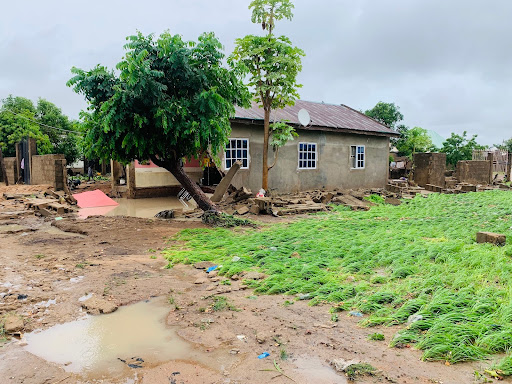
People living in flood-prone areas were said to be most affected. In Shagari phase 2, some of the access roads are also flooded. Pam Bature, a resident of the community, told HumAngle that the rain caused severe damage across the area.
“We heard that homes were getting flooded around that time [3 a.m.], so we came out and saw houses submerged in water. We did our best to carry items within our reach and help people get to safety,” he said.
Pam mentioned that the police came around 7 a.m. to survey the area.
“They asked some questions, looked around the area, and left. The Red Cross people also came, but they said their vehicle could not access the area, so they turned around and drove off,” Pam added.
He also noted that while some Shagari residents were able to swim across, others are currently trapped in their houses as they are waiting for the water levels to subside.
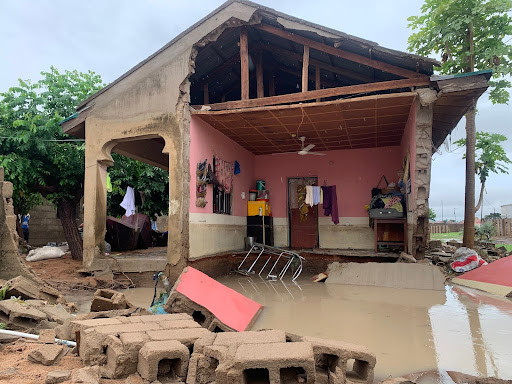
In Sabon Pegi, HumAngle observed that several homes were destroyed and others were submerged in water. While some people are trying to recover items from their flooded homes, others are counting their losses.
HumAngle spoke to Jared Enock, a resident of Sabon Pegi, who lost a portion of his house in the flood. He explained that his family was woken up by a loud thud, and when he came out, he discovered that it was his wall that had just collapsed.
“Water began to flow into the house with so much intensity the moment the wall fell. I gathered my children, and shortly after we ran out of the house, the living room collapsed with all our properties inside,” Enoch said.
Aside from his personal belongings and his gadgets, Jared also lost all his animals, which include chickens and rabbits. He is grateful that his family made it out alive.
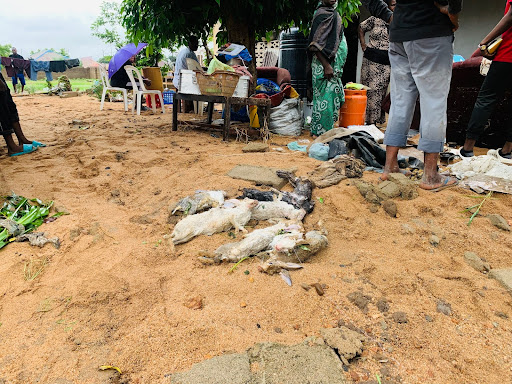
HumAngle learned that two people were swept away in Sapon Pegi. The victims were said to be children whose bodies were recovered by the National Emergency Management Agency (NEMA). The agency has not yet released a statement about the flooding disaster.

Naomi Wazumtu, another resident of Sabon Pegi Yola, is still in shock. She said she never imagined that what began as an ordinary rainfall could result in a catastrophic flood.
“My whole house is flooded. My bags of rice, maize, and all the foodstuffs in my store were submerged,” she said, sighing heavily.
In the Ibunu Abbas community, also known as Yola bypass, the situation is worse. Locals told HumAngle that NEMA officials came with a rescue vehicle and pulled out six dead bodies.
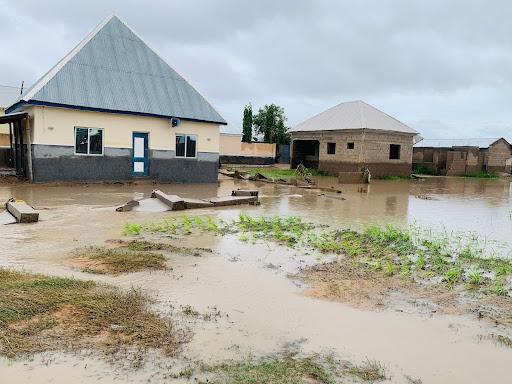
Four of the bodies were of men who were said to be workers in a bakery. The other two were children found alongside a drainage system. The bodies have been deposited at the morgue in the Moddibo Adamawa Teaching Hospital, Yola.
On the flooded streets of Ibunu Abbas, people are seen running around, calling out for their children and loved ones who are still missing. HumAngle also observed dead animals on the streets.
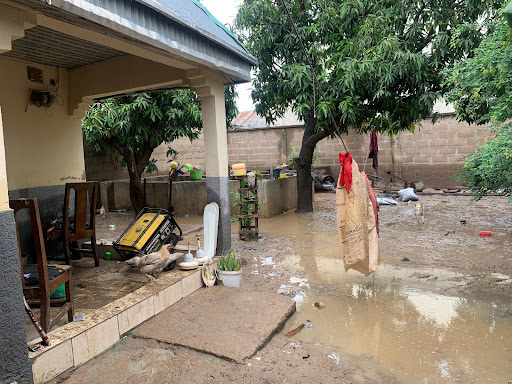
While residents across the affected communities are grappling with the tragedy, their basic concern is shelter and food.
“I’m not just looking for where my family can rest our heads right now,” Jared from Sabon Pegi said.
Grace Shombolki from Ibunu Abbas, whose entire kitchen was submerged by the flood, says her major concern is food and shelter.
“NEMA came, carried dead bodies, and left. We are calling on them and the government to come to our aid because we lost everything,” she said.
Severe flooding has devastated Yola, the capital of Adamawa State in northeastern Nigeria, after intense rainfall. The disaster, which began around 1 a.m., resulted in collapsed walls and houses, especially in areas like Shagari and Sabon Pegi. Residents, navigating flooded homes and streets, blame the disaster on heavy rains and potentially released dam water from nearby Bole. Yola, previously identified as flood-prone, had been part of a flood risk sensitization exercise by NEMA earlier in the year.
The flood’s impact is profound, with multiple fatalities and widespread property damage. Residents of affected areas, such as Shagari and Yola Bypass, report significant losses, including family members, livestock, and homes. The National Emergency Management Agency (NEMA) has been active in locating and retrieving bodies but has yet to address the residents’ pressing needs for shelter and sustenance. As the community struggles with immediate survival, they urgently seek governmental assistance to rebuild their lives.
For the past few years, governments across the world have paid close attention to conflicts in Ukraine and the Middle East. There, it is said, we see the first glimpses of what warfare of the future will look like, not just in terms of weaponry, but also in terms of new technologies and tactics.
Most recently, the United States-Israeli attacks on Iran demonstrated not just new strategies of drone deployment and infiltration but also new vulnerabilities. During the 12-day conflict, Iran and vessels in the waters of the Gulf experienced repeated disruptions of GPS signal.
This clearly worried the Iranian authorities who, after the end of the war, began to look for alternatives.
“At times, disruptions are created on this [GPS] system by internal systems, and this very issue has pushed us toward alternative options like BeiDou,” Ehsan Chitsaz, deputy communications minister, told Iranian media in mid-July. He added that the government was developing a plan to switch transportation, agriculture and the internet from GPS to BeiDou.
Iran’s decision to explore adopting China’s navigation satellite system may appear at first glance to be merely a tactical manoeuvre. Yet, its implications are far more profound. This move is yet another indication of a major global realignment.
For decades, the West, and the US in particular, have dominated the world’s technological infrastructure from computer operating systems and the internet to telecommunications and satellite networks.
This has left much of the world dependent on an infrastructure it cannot match or challenge. This dependency can easily become vulnerability. Since 2013, whistleblowers and media investigations have revealed how various Western technologies and schemes have enabled illicit surveillance and data gathering on a global scale – something that has worried governments around the world.
Iran’s possible shift to BeiDou sends a clear message to other nations grappling with the delicate balance between technological convenience and strategic self-defence: The era of blind, naive dependence on US-controlled infrastructure is rapidly coming to an end. Nations can no longer afford to have their military capabilities and vital digital sovereignty tied to the satellite grid of a superpower they cannot trust.
This sentiment is one of the driving forces behind the creation of national or regional satellite navigation systems, from Europe’s Galileo to Russia’s GLONASS, each vying for a share of the global positioning market and offering a perceived guarantee of sovereign control.
GPS was not the only vulnerability Iran encountered during the US-Israeli attacks. The Israeli army was able to assassinate a number of nuclear scientists and senior commanders in the Iranian security and military forces. The fact that Israel was able to obtain their exact locations raised fears that it was able to infiltrate telecommunications and trace people via their phones.
On June 17 as the conflict was still raging, the Iranian authorities urged the Iranian people to stop using the messaging app WhatsApp and delete it from their phones, saying it was gathering user information to send to Israel. Whether this appeal was linked to the assassinations of the senior officials is unclear, but Iranian mistrust of the app run by US-based corporation Meta is not without merit.
Cybersecurity experts have long been sceptical about the security of the app. Recently, media reports have revealed that the artificial intelligence software Israel uses to target Palestinians in Gaza is reportedly fed data from social media. Furthermore, shortly after the end of the attacks on Iran, the US House of Representatives moved to ban WhatsApp from official devices.
For Iran and other countries around the world, the implications are clear: Western platforms can no longer be trusted as mere conduits for communication; they are now seen as tools in a broader digital intelligence war.
Tehran has already been developing its own intranet system, the National Information Network, which gives more control over internet use to state authorities. Moving forward, Iran will likely expand this process and possibly try to emulate China’s Great Firewall.
By seeking to break with Western-dominated infrastructure, Tehran is definitively aligning itself with a growing sphere of influence that fundamentally challenges Western dominance. This partnership transcends simple transactional exchanges as China offers Iran tools essential for genuine digital and strategic independence.
The broader context for this is China’s colossal Belt and Road Initiative (BRI). While often framed as an infrastructure and trade project, BRI has always been about much more than roads and ports. It is an ambitious blueprint for building an alternative global order. Iran – strategically positioned and a key energy supplier – is becoming an increasingly important partner in this expansive vision.
What we are witnessing is the emergence of a new powerful tech bloc – one that inextricably unites digital infrastructure with a shared sense of political defiance. Countries weary of the West’s double standards, unilateral sanctions and overwhelming digital hegemony will increasingly find both comfort and significant leverage in Beijing’s expanding clout.
This accelerating shift heralds the dawn of a new “tech cold war”, a low-temperature confrontation in which nations will increasingly choose their critical infrastructure, from navigation and communications to data flows and financial payment systems, not primarily based on technological superiority or comprehensive global coverage but increasingly on political allegiance and perceived security.
As more and more countries follow suit, the Western technological advantage will begin to shrink in real time, resulting in redesigned international power dynamics.
The views expressed in this article are the author’s own and do not necessarily reflect Al Jazeera’s editorial stance.
Months after stopping all supplies from entering Gaza, Israel has airdropped a few aid cartons and allowed some trucks to enter the Strip, following immense international pressure. Israel says it’s also begun 10-hour pauses in fighting in three locations ‘for humanitarian purposes’, but continuing attacks killed more than 50 Palestinians on Sunday.
Published On 27 Jul 202527 Jul 2025
In Shambat al-Aradi, a tight-knit neighbourhood in Khartoum North once known for its vibrant community gatherings and spirited music festivals, two childhood friends have suffered through confinement and injustice at the hands of one of Sudan’s warring sides.
Khalid al-Sadiq, a 43-year-old family doctor, and one of his best friends, a 40-year-old musician who once lit up the stage of the nearby Khedr Bashir Theatre, were inseparable before the war.
But when the civil war broke out in April 2023 and fighting tore through their city, both men, born and raised near that beloved theatre, were swept into a campaign of arbitrary arrests conducted by the paramilitary Rapid Support Forces (RSF).
The friends were detained separately and tortured in different ways, but their experiences nonetheless mirrored one another – until they emerged, physically altered, emotionally broken and forever bound by survival.
Al-Sadiq’s ordeal began in August 2023 when RSF forces raided Shambat and arbitrarily arrested him and countless other men.
He was crowded into a bathroom in a house that the RSF had looted along with seven other people and was kept there for days.
“We were only let out to eat, then forced back in,” he explained.
During his first days of interrogation, al-Sadiq was tortured repeatedly by the RSF to pressure him for a ransom.
They crushed his fingers, one at a time, using pliers. At one point, to scare him, they fired at the ground near him, sending shrapnel flying into his abdomen and causing heavy bleeding.
After three days, the men were lined up by their captors.
“They tried to negotiate with us, demanding 3 million Sudanese pounds [about $1,000] per person,” al-Sadiq recalled.
Three men were released after handing over everything they had, including a rickshaw and all their cash. Al-Sadiq and the other remaining prisoners were moved to a smaller cell – an even more cramped toilet tucked beneath a staircase.
“There was no ventilation. There were insects everywhere,” he said. They had to alternate sleeping – two could just about lie down while two stood.
A few kilometres away, al-Sadiq’s friend, the musician, who asked to remain anonymous, had also been arrested and held at the Paratrooper Military Camp in Khartoum North, which the RSF captured in the first months of the war with Sudan’s military.
That would not be the only time the musician was taken because the RSF had been told that his family were distantly related to former President Omar al-Bashir.
“They said I’m a ‘remnant of the regime’ because of that relation to him even though I was never part of the regime. I was against it,” he said, adding that he had protested against al-Bashir.

Months into the war, his family’s Shambat home was raided by the RSF and his younger brother was shot in the leg. To keep everybody safe, the musician quickly evacuated his family to Umm al-Qura in Gezira state, then went home to collect their belongings. That was when he was arrested.
During his time at the military camp, he told Al Jazeera, the RSF fighters would tie him and other prisoners up and lay them facedown on the ground in the yard. Then they would beat them with a “sout al-anag” whip, a Sudanese leather whip traditionally made of hippo skin.
The flogging lasted a long time, he added, and it was not an isolated incident. It happened to him several times.
In interrogations, RSF personnel fixated on his alleged affiliation with al-Bashir, branding him with slurs like “Koz”, meaning a political Islamist remnant of al-Bashir’s regime, and subjecting him to verbal and physical abuse.
He was held for about a month, then released to return to a home that had been looted.
He would be detained at least five more times.
“Most of the detentions were based on people informing on each other, sometimes for personal benefit, sometimes under torture,” al-Sadiq said.
“RSF commanders even brag about having a list of Bashir regime or SAF [Sudan armed forces] supporters for every area.”
While he was held by the RSF, the musician told Al Jazeera, he and others were forced to perform manual labour that the fighters did not want to do.
“They used to take us out in the morning to dig graves,” he said. “I dug over 30 graves myself.”
The graves were around the detention camp and seemed to be for the prisoners who died from torture, illness or starvation.
While he could not estimate how many people were buried in those pits, he described the site where he was forced to dig, saying it already had many pits that had been used before.
Meanwhile, al-Sadiq was blindfolded, bound and bundled into a van and taken to an RSF detention facility in the al-Riyadh neighbourhood.
The compound had five zones: a mosque repurposed into a prison, a section for women, an area holding army soldiers captured in battle, another for those who surrendered and an underground chamber called “Guantanamo” – the site of systematic torture.
Al-Sadiq tried to help the people he was imprisoned with, treating them with whatever they could scavenge and appealing to the RSF to take the dangerously sick prisoners to a hospital.

But the RSF usually ignored the pleas, and al-Sadiq still remembers one patient, Saber, whom the fighters kept shackled even as his health faded fast.
“I kept asking that he be transferred to a hospital,” al-Sadiq said. “He died.”
Some prisoners did receive treatment, though, and the RSF kept a group of imprisoned doctors in a separate room furnished with beds and medical equipment.
There, they were told to treat injured RSF fighters or prisoners the RSF wanted to keep alive, either to keep torturing them for information or because they thought they could get big ransoms for them.
Al-Sadiq chose not to go with the other doctors and decided to cooperate less with the RSF, keeping to himself and staying with the other prisoners.
Conditions were inhumane in the cell he chose to remain in.
“The total water we received daily – for drinking, ablution, everything – was six small cups,” al-Sadiq said, adding that food was scarce and “insects, rats and lice lived with us. I lost 35kg [77lb].”
Their captors did give him some medical supplies, however, when they needed him to treat someone, and they were a lifeline for everyone around him.
The prisoners were so desperate that he sometimes shared IV glucose drips he got from the RSF so detainees could drink them for some hydration.
The only other sources of food were the small “payments” of sugar, milk or dates that the RSF would give to prisoners who they forced to do manual labour like loading or unloading trucks.
Al-Sadiq did not speak of having been forced to dig graves for fellow prisoners or of having heard of other prisoners doing that.
For the musician, however, graves became a constant reality, even during the periods when he was able to go back home to Shambat.
He helped bury about 20 neighbours who died either from crossfire or starvation and had to be buried anywhere but in the cemeteries.
The RSF blocked access to the cemeteries without explaining why to the people who wanted to lay their loved ones to rest.
In fact at first, the RSF prohibited all burials, then relented and allowed some burials as long as they were not in the cemeteries.
So the musician and others would dig graves for people in Shambat Stadium’s Rabta Field and near the Khedr Bashir Theatre.

He said many people who were afraid to leave their homes at all ended up burying their loved ones in their yards or in any nearby plots they could furtively access.
The friends’ ordeals lasted into the winter when al-Sadiq found himself released and the RSF stopped coming around to arrest the musician.
Neither man knows why.
Both al-Sadiq and the musician told Al Jazeera they remain haunted by what they endured.
The torment, they said, didn’t end with their release; it followed them, embedding itself in their thoughts, a shadow they fear will darken the rest of their lives.
On March 26, the SAF announced it had recaptured Khartoum. Now, the two men have returned to their neighbourhood, where they feel a greater sense of safety.
Having been detained and tortured by the RSF, they believe they’re unlikely to be viewed by the SAF as collaborators – offering them, at least, a fragile sense of safety.

 EPA
EPADonald Trump will spend the second full day of his visit to Scotland back on the golf course before meeting the EU Commission president for trade talks.
The US president will again play a round at Turnberry in South Ayrshire with guests and family, including his son Eric.
It is believed his only major business meeting will be with Ursula von der Leyen, who has said they will discuss “transatlantic trade relations, and how we can keep them strong”.
Trump is due to meet UK Prime Minister Sir Keir Starmer and Scotland’s First Minister John Swinney on Monday, as well as opening a second 18-hole course at his estate in Aberdeenshire.
The president arrived in Scotland on Friday evening, with Air Force One touching down at Glasgow Prestwick Airport before his entourage travelled to nearby Turnberry.
He has said he “it’s great to be in Scotland” and has praised Starmer and Swinney ahead of meeting them.
A major security operation was ramped up at Turnberry before Trump played 18 holes on Saturday.
He waved to photographers and the assembled media as his day passed without incident.
Several roads remain closed in the area while police and military personnel have been carrying out checks around the resort.

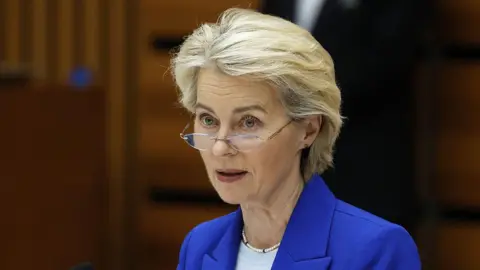 Getty Images
Getty ImagesA security checkpoint has been put in place outside the hotel and a large fence has been erected around the course.
Elsewhere, several hundred demonstrators gathered in both Aberdeen and Edinburgh on Saturday to protest against the visit.
Trump is expected to meet Starmer and Swinney on Monday before officially opening his new golf course at Menie in Aberdeenshire.
The US president will travel back to Washington on Tuesday and is due to return to the UK for an official state visit in September.

 Reuters
ReutersThe Swedish striker joins the London club after scoring 97 goals for Sporting Lisbon over the past two seasons.
Arsenal have signed Sweden forward Viktor Gyokeres, bringing an end to the Premier League club’s years-long search for a prolific goalscorer.
Gyokeres completed a move from Sporting Lisbon on Saturday worth a reported 63 million pounds ($85m) and signed a five-year contract.
“Viktor is an exceptional talent and has consistently demonstrated he has the qualities and winning mentality required of a top-level centre-forward. His physicality, intelligence and work ethic make him a perfect fit for our vision,” said Arsenal sporting director Andrea Berta.
The 27-year-old striker joins Arsenal after establishing himself after two outstanding seasons in Portugal, in which he fired Lisbon to back-to-back league titles with 97 goals, including 54 goals in 52 appearances across all competitions in the 2024-25 season, outscoring the likes of superstars Kylian Mbappe, Erling Haaland and Mohamed Salah.
A top-class striker has long been considered the missing element for Arsenal, which came runner-up in each of the last three Premier League seasons. The failure to bring one in during the January transfer window badly undermined its attempts to challenge Liverpool for the title last term.
“The consistency he has shown in his performances and availability have been outstanding, and his goal contributions speak for themselves,” said manager Mikel Arteta. “He is a quick and powerful presence up front, with incredible goalscoring numbers at club and international levels.”
Gyokeres returns to England after joining Brighton as a youth player and later emerging at second-tier Coventry, where his 22 goals helped the team reach the playoff final in 2023.
His record of 40 goals in 97 games for Coventry caught the attention of Lisbon and led to a 20.5 million pounds ($25m) move to the Portuguese club.
His explosive form over the past two seasons has seen frequent speculation about a move to one of European football’s giants, including Manchester United. But Arsenal has won the race for his signature, and the transfer represents a remarkable rise for a player who was first developed at Brommapojkarna, a Swedish club with a reputation for guiding the careers of some of the country’s best emerging talents.
“He was a late developer because he was not the best striker or the best player in Brommapojkarna at age 16, 17, 18, 19,” Dalibor Savic, his former youth coach at the Swedish club, told The Associated Press in November. “If he aims at something, he will achieve it.”
Gyokeres will have to prove he can make the step up to the Premier League after failing to break through at Brighton, a club known for unearthing players like Moises Caicedo and Alexis Mac Allister in recent years. He only made eight appearances for the club and was loaned to St Pauli in Germany and Swansea before his permanent move to Coventry.
His performances for Sweden and in the Champions League suggest he will be able to continue that form at Arsenal.
He was the leading scorer in the Nations League, with nine goals, outscoring Cristiano Ronaldo and Haaland, and hit six in eight appearances in the Champions League for Lisbon last season.

The murder of Wadee Alfayoumi and attack on his mother stand as one of the worst hate crimes in the US since Gaza war began.
A United States landlord who was jailed for decades for the horrific October 2023 stabbing death of a six-year-old Palestinian-American boy, and for critically injuring his mother, has died in prison.
Joseph Czuba, 73, died on Thursday in the custody of the Illinois Department of Corrections, the Chicago Sun-Times reported on Saturday, citing the Will County Sheriff’s Office. The law enforcement agency did not return a call seeking comment on the death, according to the Associated Press news agency.
The murder of the boy, Wadee Alfayoumi, and the attack on his mother, Hanan Shaheen, was one of the earliest and worst hate crime incidents in the US since the start of Israel’s war on Gaza.
Three months ago, Czuba was sentenced to 53 years in prison for the attack. He was found guilty in February of murder, attempted murder and hate-crime charges for Alfayoumi’s death and for wounding Shaheen.
Czuba attacked them on October 14, 2023, because they were Muslims, and as a response to the Hamas-led October 7 attacks on southern Israel.
Ahmed Rehab, the executive director of the Council on American-Islamic Relations’ Chicago office, said in a statement on Saturday that “this depraved killer has died, but the hate is still alive and well”.
Evidence at trial included harrowing testimony from Shaheen and her frantic 911 call, along with bloody crime scene photos and a police video. Jurors deliberated for less than 90 minutes before handing in a verdict.
The family had been renting rooms in Czuba’s home in Plainfield, about 40 miles (64km) from Chicago, when the attack happened.
Central to the prosecutors’ case was harrowing testimony from the boy’s mother, who said Czuba attacked her before moving on to her son, insisting they had to leave because they were Muslim.
“He told me: ‘You, as a Muslim, must die,’” said Shaheen during her testimony.
Czuba’s ex-wife, Mary, also testified for the prosecution, saying he had become agitated about Israel’s war on Gaza, which has now killed nearly 60,000 Palestinians.
Police said Czuba pulled a knife from a holder on a belt and stabbed the boy 26 times. Some of the bloody crime scene photos were so explicit that the judge agreed to turn television screens showing them away from the audience, which included Wadee’s relatives.
The case generated headlines around the world and deeply struck the Chicago area’s large and established Palestinian community amid rising hostility against Muslims and Palestinians in the US. Wadee’s funeral drew large crowds, and Plainfield officials have dedicated a park playground in his honour.
Other similarly-motivated incidents in the US include the attempted drowning of a three-year-old Palestinian-American girl in Texas, the stabbing of a Palestinian-American man in Texas, the beating of a Muslim man in New York, a violent mob attack on pro-Palestinian protesters in California and a Florida shooting of two Israeli visitors whom the suspect mistook for Palestinians.
Three young Palestinian men were also shot near a university campus in Vermont just weeks after Alfayoumi was stabbed to death.
BBC News in Geneva

 PA
PAIf you’re a fan of the England women’s football team, chances are you’ve been on a bit of an emotional rollercoaster.
An agonisingly close quarter-final against Sweden ended with a tense penalty shootout, while an equalising semi-final goal from Michelle Agyemang only happened in the 96th minute.
“I feel like I’m going to have to go to the doctors when I get home,” says Jenny, from Kent, who watched it all from the stands.
“They are putting us through the ringer.”
“I basically bit all my nails off,” says Sophie, who is in Switzerland with her sister, Charlotte.
Meanwhile, Nicola, from Basingstoke, describes feeling shaky. “I had to take some time to decompress.”
Even if you weren’t watching the action with thousands of other jittery fans in the stadium, chances are you’ve felt some of the same effects. But whether you’re in the stands or on the sofa, why do football matches produce such intense physical reactions?
The answer lies in our hormones says Dr Martha Newson, Associate Professor in Psychology at the University of Greenwich.
Testosterone, she explains, goes up on match days, as does adrenaline and the stress hormone cortisol. The most loyal fans have the biggest stress response, she says, and that’s the same for men and women.
During peaks in the game – like a nail-biting penalty shootout – the adrenaline rush, or fight or flight response, prepares the body for action, says Dr David Crepaz-Keay, Head of Research and Applied Learning at the Mental Health Foundation.
While it can feel scary, there’s nothing to be alarmed about – it’s a sign that you care.
“You are just completely there with them and it’s like you’re walking up to the spot, ready to take that penalty… your senses are just going into overdrive.”
The heart rate rises as it rushes to send more oxygen around the body. And if you feel buzzy, he says, that’s because the effects can act as stimulant.
They can last for hours, affecting our sleep as we come down from our excitement and can even influence our behaviour the following day. Don’t be surprised if you feel like eating more after the match or getting out the credit card.
“Fans consume more calories after a loss,” says Dr Newson, explaining that they’re responding to a psychological need to replenish their reserves after a time of hardship.
On the flip side, fans might feel an urge to splurge after a win. “We can see the evolutionary mind working like, okay, I’ve won so I can spend money, I can accumulate resources,” she says.
All this for a sport that’s supposed to be about fun and bonding. So what can fans do to manage these very real side-effects?

 Getty Images
Getty ImagesDr Joseph Barker, a clinical psychologist for the NHS and Lecturer in Clinical Psychology at Norwich Medical School, advises getting a good rest the night before.
Having a clear match day plan of where you are going, what you are doing and what you are likely to do afterwards will also help alleviate stress.
“As we’ve got no control during the game, if we can find things to control before and after the game that can build our emotional resilience to cope.”
It’s important to eat well, he says, and as much as it might be tempting, he advises against drinking alcohol, because it gives us less ability to regulate our emotions.
If things get too tense, he says fans can always take a break and rejoin the match a bit later.
Dr Crepaz-Keay says movement is key to help manage that adrenaline surge – when your body is geared up for action, there’s nowhere for that energy to go if you stay on the sofa. But just remember to keep anything breakable out of arm and leg reach.
Most of all, the experts advise trying to reframe the nerves and jitters as an enjoyable experience.
“In England particularly, we are not necessarily brought up to express our emotions. And sport gives us the excuse to do that. Sport gives us licence to shout, to scream, to dance, to cheer, to sing,” says Dr Crepaz-Keay.
“Even if we don’t win, you’re still part of something bigger… that’s something that we can all take pride and joy in.”
It’s a view shared by Jenny and Charlotte in Geneva.
Charlotte advises embracing the stress and having patience as “anything can happen in the last second”.
“You’re going to get overwhelmed and your heart rate will go up… but this is really exciting.”
Additional reporting by Elise Wicker and Yazmina Garcia
A Syrian official tells Al Jazeera Damascus emphasises the unity and sovereignty of Syria are nonnegotiable.
Syrian and Israeli officials have held talks in Paris mediated by the United States, according to a Syrian official, in the wake of an eruption of sectarian violence compounded by Israeli military intervention in southern Syria.
The meeting on Saturday was held to address recent security developments around the southern Druze-majority city of Suwayda, which has been the scene of fierce fighting in recent weeks between Bedouins and Druze fighters.
Israel intervened in the conflict, striking government buildings in Damascus and government soldiers in Suwayda province, saying it was doing so to protect the Druze.
The Syrian official told Al Jazeera Arabic that Damascus’s delegation at the Paris meeting emphasised that the unity and sovereignty of Syria are nonnegotiable and Suwayda and its people are an integral part of Syria. It also rejected any attempt to exploit segments of Syrian society for partition, the official said.
The source said the Syrian delegation held Israel responsible for the recent escalation and demanded the immediate withdrawal of Israeli forces from the points they had recently advanced to during the unrest.
Syria’s state-run Ekhbariya TV, quoting its own diplomatic source, reported that the meeting did not result in any final agreements but the parties had agreed to continue talks aimed at maintaining stability.
The TV source described the dialogue as “honest and responsible” in the first confirmation from the Syrian side that talks had taken place.
On Friday, US envoy Tom Barrack said officials from both countries spoke about de-escalating the situation in Syria during talks on Thursday.
Hundreds of people have been reported killed in the fighting in Suwayda, which also drew in government forces. Israel, which carried out air strikes, during this month’s violence, has regularly struck Syria and launched incursions into its territory since longtime former President Bashar al-Assad was toppled in December.
Last week’s fighting underlined the challenges interim President Ahmed al-Sharaa faces in stabilising Syria and maintaining centralised rule.
Syria’s government announced a week ago that Bedouin fighters had been cleared out of Suwayda and government forces were deployed to oversee their exit from the entire province.
The announcement came after al-Sharaa ordered a new ceasefire between Bedouin and Druze groups after a separate US-brokered deal to avert further Israeli military attacks on Syria.
The diplomatic source, who spoke to Ekhbariya TV, said the meeting on Saturday involved initial consultations aimed at “reducing tensions and opening channels of communication amid an ongoing escalation since early December”.
OXFAM policy lead Bushra Khalidi says Israel’s restrictions are starving Gaza’s most vulnerable who can't reach aid.
Source link
The UK has condemned the latest cash offer from Hong Kong authorities for people who help in the arrest of pro-democracy activists living in Britain.
In a joint statement, Foreign Secretary David Lammy and Home Secretary Yvette Cooper described the move as “another example of transnational repression”.
People are being offered between $25,000 (HK$200,000) and $125,000 for information leading to the arrest of 19 individuals, all of whom are pro-democracy activists living abroad.
China has denounced as “interference” criticism over this type of appeal, which it has made three times previously.
The 19 people are accused of violating Beijing’s national security law imposed in 2020 in response to the 2019 anti-government protests that rocked the city for months.
The amounts on offer vary depending on the individual. Among the highest offers on the list are those for Choi Ming-da and Fok Ka-chi, who Hong Kong police said operated a social media channel named “Tuesdayroad”.
Politician Nathan Law – who had been a lawmaker on the Legislative Council of Hong Kong – and activist and commentator Yuan Gong-Yi also appear on the lists.
The first such rewards were issued in July and December 2023. They targeted Mr Law – who told the BBC that his life became more dangerous after a bounty was announced – and Simon Cheng, a former UK consulate employee detained in 2019 in a high-profile case.
The third series of rewards targeted six pro-democracy activists living in the UK and Canada, including Tony Chung, the former leader of a pro-independence group.
A special visa scheme introduced in 2021 saw around 150,000 Hong Kong residents move to the UK, according to the Home Office.
In November last year a Hong Kong court sentenced dozens of pro-democracy leaders to years in jail for subversion, following a controversial national security trial.
In their statement in response to the latest bounty, Ms Cooper and Mr Lammy said: “This government will continue to stand with the people of Hong Kong, including those who have made the UK their home.
“We take the protection of their rights, freedoms, and safety very seriously.”
Their joint statement added: “The UK is committed to human rights, the rule of law, and the safety of all individuals in the UK.
“That’s why we have taken further steps to complete the severing of ties between the UK and Hong Kong extradition systems by removing Hong Kong from the Extradition Act 2003.”

Scores of civilians were killed during fierce confrontations between the Democratic Republic of Congo (DRC) army and the Convention pour la Révolution Populaire (CRP) armed syndicate. The Cooperative for the Development of Congo (CODECO), another rebel group, compounded the violence, launching a series of attacks in rural communities of the Djugu territory, particularly in Nizi and Lopa.
The attacks have grounded economic activities in the principal centres of Iga-Barriere, Lopa, and Jina, interrupting traffic on the Number 27 national highway.
“The security situation has been relatively calm since yesterday in Lopa, Nizi, Iga-Barriere and its environs. Right now, socio-economic activities have still not resumed, and there are ongoing negotiations for the resumption of activities after clashes between the Congo army and rebels of the Convention pour la Revolution Populaire, before the incursion of CODECO militia,” Freddy Lotsima, a civil society leader in Lopa, revealed.
Amid growing concerns regarding the handling of the security crisis in Ituri, the military has refused to respond to various claims of misconduct by its personnel. Gratien Iracan, a leader in the Bunia constituency, however, claimed that between July 13 and 21, over 30 civilians were killed in Djugu alone.
“Unarmed civilians murdered in cold blood without the protection of the army and the United Nations Organisation Stabilisation Mission in the DR Congo (MONUSCO). Elements of the loyalist forces, as well as CODECO militia, have been accused by members of the local communities,” Lotsima added.
MONUSCO has condemned the attacks on civilian populations in the Djugu territory, as well as the looting and desecration of the Catholic parish of Lopa, which have been attributed to the CODECO armed group. The UN forces have been encouraging provincial authorities to promote dialogue among all communities in Ituri to help reduce tensions.
In the Masisi territory of North Kivu, intense fighting has been ongoing since 2 a.m. on Friday, July 25, between M23 rebels and the Wazalendo militia in the Luke area, part of the Nyamaboko 1 tribal group. Local sources revealed that the Wazalendo militia launched coordinated attacks on rebel positions to reclaim control of the area.
The sounds of heavy and light weapon detonations were heard in the combat areas. This situation has raised concerns among residents of nearby communities, who have been receiving displaced individuals from Luke and Katobotobo in the Katoy region.
Scores of civilians were killed in the Democratic Republic of Congo during clashes between the national army and the CRP armed group. CODECO rebels intensified the violence with attacks in rural areas like Nizi and Lopa, halting economic activities and interrupting national highway traffic. The security situation, currently calm, has stalled socio-economic recovery, with talks ongoing for resumption after the conflict.
Military responses to the crisis in Ituri have been questioned, with Gratien Iracan reporting over 30 civilian deaths in Djugu. Allegations of civilian killings implicate CODECO and loyalist forces, criticized by civil leaders for lack of protection. MONUSCO condemned the attacks and urged dialogue among communities to ease tensions.
Simultaneously, in North Kivu’s Masisi territory, fighting erupted between M23 rebels and the Wazalendo militia. The militia attempted to reclaim control of the Luke area with coordinated offenses. The violence has spurred concern among nearby communities, which are now receiving displaced people from affected regions.
UK Foreign Secretary Lammy, Home Secretary Cooper call on China to stop targeting opposition voices living in Britain.
The United Kingdom has condemned Hong Kong authorities for offering payment in exchange for assisting in the arrest of pro-democracy activists living in Britain, even as the British government begins the process of reinstating an extradition deal with the autonomous Chinese city.
Foreign Secretary David Lammy and Home Secretary Yvette Cooper issued a joint statement on Friday shortly after Hong Kong announced cash rewards for information leading to the arrest of 19 pro-democracy activists based abroad, including in Britain, who are accused of violating the strict national security law imposed by Beijing in 2020.
In their statement, Lammy and Cooper called on China to stop targeting opposition voices in Britain.
“The Hong Kong Police Force’s issuing of further arrest warrants and bounties on individuals living in the UK is another example of transnational repression,” their statement read.
The bounties range from 200,000 to one million Hong Kong dollars (about $25,000-$125,000), depending on the individual the Hong Kong authorities seek to arrest.
This is the fourth time Hong Kong authorities have made reward offers, which have drawn strong criticism from Western countries, to which China, in turn, has denounced as “interference”.
In their statement, the two British ministers said that “this Government will continue to stand with the people of Hong Kong, including those who have made the [United Kingdom] their home. We take the protection of their rights, freedoms, and safety very seriously”.
But a recent proposal by the British government to reform extradition rules has prompted serious concerns, with some fearing it could pave the way for a resumption of extraditions to Hong Kong, which have been suspended since the 2020 national security law was enacted.
On Friday, Al Jazeera reported that the UK Home Office applied to Parliament to make changes to the country’s legislation regarding extradition on July 17, followed by a letter to Shadow Home Secretary Chris Philp the next day.
“It is in our national interest to have effective extradition relationships to prevent criminals from evading justice and the UK becoming a haven for criminals,” the July 18 letter from Security Minister Dan Jarvis said.
The Home Office also plans to restore an extradition framework with Chile and Zimbabwe, according to the letter, which was shared on X by Conservative MP Alicia Kearns.
Cases for Hong Kong and Zimbabwe would both be considered on a “case-by-case basis”, Jarvis said.
About 150,000 Hong Kong nationals migrated to the UK under a special visa scheme introduced in 2021.

In 2024, legislators in Hong Kong approved a new national security law – referred to as Article 23 – that gave the government new powers to crack down on all forms of dissent on the grounds of alleged treason, espionage, sedition and external interference in Hong Kong’s internal affairs. Since then, Hong Kong has been offering bounties for the arrest of activists who have fled the city while facing charges related to the pro-democracy protests.
Hong Kong, a former British colony, is a particular sticking point for the UK due to its historical relationship and the sharp decline in political freedoms in Hong Kong since China imposed controversial national security legislation in 2020.
The former British colony returned to Chinese rule in 1997 with the guarantee of a high degree of autonomy, including freedom of speech, under a “one country, two systems” formula.